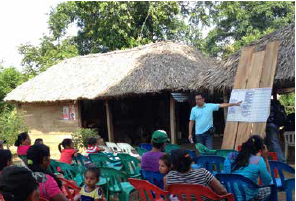
Description of the project: Rural areas in Córdoba, in the north of Colombia, suffer tropical storms and droughts that compromise communities’ food security and access to clean water. This project rehabilitates ancestral knowledge, using locally adapted seeds and small livestock species, to support climate-resilient traditional agriculture and promote sustainable water gathering, storage and management. Among the 200 beneficiary families, 38 have participated in ecological trainings enabling them to restore 20 ancient crops, create organic fertiliser out of compost, increase crop yields and reinsert two livestock species in their farming ecosystems.
Climate impact: This project addresses climate adaptation by securing clean water and food security in strongly impacted areas. Since 2015, four water sources have been protected by introducing ecological sanitation and nine rainwater tanks of 22,000 liters each have been built, which allows for regular irrigation. Reintegrating livestock and organic compost in the farming ecosystem contributes to natural carbon sequestration in the soil and to improved soil fertility.
Gender impact: This project improves the livelihoods of all community members, with a strong gender approach: young women have been empowered to take on leading roles in the water committees, as their time was freed up from the heavy burden of water-gathering. Traditionally gendered roles have been interchanged and men are now actively involved in cooking activities aiming to rehabilitate ancestral nutritious recipes, as well as in the production of natural cosmetics.
Scalability / replicability: Working closely with the four target communities in a bottom-up approach ensures a strong reappropriation of their ancestral knowledge, and the assertion of their rights with local authorities. By taking control and learning how to best manage their resources, communities are empowered to scale-up this initiative in other parts of the country.